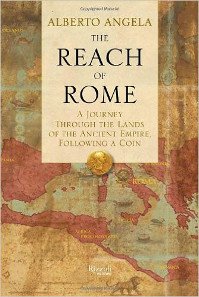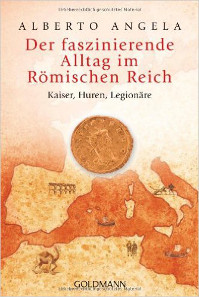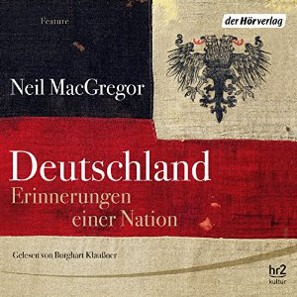translated by Annika Backe
Roman everyday history: exciting as a novel
Some publishers deserve to be beaten up for disfiguring titles, when they think a book sells better that way. “Impero. Viaggio nell’Impero di Roma seguendo una moneta” is the Italian original title of the latest book written by Alberto Angela. “Kaiser, Prostitutierte, Legionäre” (“Emperors, prostitutes, legionaries”) reads the title the publisher has given the German version, supplemented by “Der faszinierende Alltag im Römischen Reich” (“The fascinating everyday-life in the Roman Empire”). I almost did not buy the book, despite Alan Walker’s recommendation – only because of the title. He had read the English translation, whose title “The Reach of Rome: A Journey Through the Lands of the Ancient Empire, Following a Coin” has a much more appetizing appeal.
The protagonist of the story is a sestertius, which passes from hand to hand and reaches one Roman province after another. At each place, its owner provides the occasion to look at a facet of the Roman Empire in closer detail. Be it wine-growing on the Moselle, the three types of Roman kissing, the post, or robbery. We attend a common dinner invitation among friends and go across the ocean on a Roman ship.
Even if the work is a non-fiction book, which, thank God, does not stick rigorously to the sestertius story, it almost reads like a novel and also enriches the knowledge of the specialist in Roman day-to-day history by details that he has never reflected about before.
We know, at the latest since he moved to Berlin, that the former director of the British Museum has a soft spot for Germany. However, already in the winter of 2014/2015 he had organized in London a widely acclaimed exhibition on German history, which was very interesting especially for us Germans. As a matter of fact, it breaks with our school book past and points towards phenomena which must look strange to a foreigner.
Making money – what really moved our world
Terry Pratchett is not everybody’s cup of tea. His discworld is too absurd to immediately fall in love with. But once you have caught fire, you cannot lay aside the small masterpieces of this author, who has died in March 2015. The way he discworldizes modern phenomena and thus reduces them to absurdity proves addictive.
Pratchett has also dealt with the oddities of a fiat currency. In his book “Making Money”, he tells the hilarious story of a small time crook who, on behalf of the government, is appointed with knocking the banking system of Ankh-Morpork into shape again. The freshly minted bank director gets his inspirations from his first job at the Ankh-Morpork Mail. As postal minister he had given the rotten institution a new existence in a furious application of state-of-the-art advertising technology and, as a side-effect, supplied a booming collectors market with his products.
Reading this farce, the reader learns more about money than all the economic studies could ever tell him. It becomes clear that, at the end of the day, it is all about believing and the show which makes people believe in things.
Although “Making Money” was published already in 2007, I will not stop recommending this funny book.
I hope that you have enough entertainment for the boxing week now, when there will be no CoinsWeekly as divertissement. But you know that our archive is always open and contains almost 6,000 articles by now…








